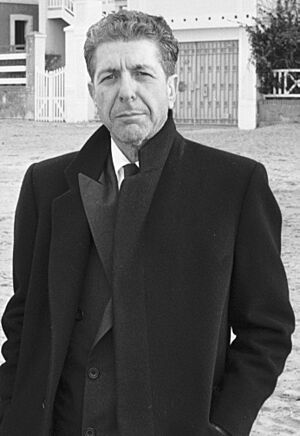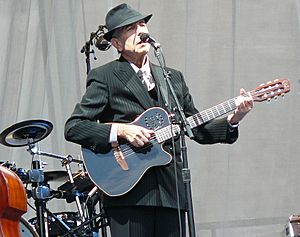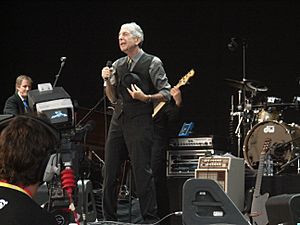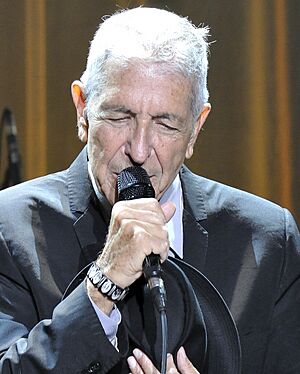Leonard Cohen facts for kids
Quick facts for kids
Leonard Cohen
|
|
|---|---|
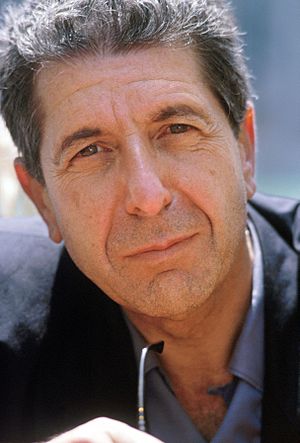
Cohen in Venice, 1988
|
|
| Born | September 21, 1934 Westmount, Quebec, Canada
|
| Died | November 7, 2016 (aged 82) Los Angeles, California, U.S.
|
| Resting place | Shaar Hashomayim Congregation Cemetery, Montreal, Canada |
| Occupation |
|
| Years active | 1954–2016 |
| Children | 2, including Adam |
| Relatives | Lyon Cohen (grandfather) |
| Musical career | |
| Genres | |
| Instruments |
|
| Labels | Columbia |
| Signature | |
Leonard Norman Cohen (September 21, 1934 – November 7, 2016) was a famous Canadian singer, songwriter, poet, and novelist. He wrote songs and poems that explored big ideas like faith, life, and love. He is known for his deep voice and thoughtful lyrics.
Cohen was honored many times for his work. He was inducted into the Canadian Music Hall of Fame and the Rock and Roll Hall of Fame. He also received the Order of Canada, which is the highest award a civilian can get in Canada. In 2011, he won a special award for literature called the Prince of Asturias Award.
Even though he started as a poet and novelist, Cohen began his music career in 1967. His first album, Songs of Leonard Cohen, was released that year. He then released more folk music albums like Songs from a Room (1969) and Songs of Love and Hate (1971).
In 1979, Cohen released Recent Songs, which mixed his acoustic style with jazz and other influences. His most famous song, "Hallelujah", came out in 1984. Later, his album I'm Your Man (1988) showed a new electronic sound. He continued to release albums throughout his life, with his last one, You Want It Darker, coming out just before he passed away in 2016. Another album, Thanks for the Dance, was released after his death in 2019.
Contents
Early Life and Growing Up
Leonard Norman Cohen was born in Westmount, Quebec, Canada, on September 21, 1934. His family was Jewish. His father, Nathan Bernard Cohen, owned a clothing store and passed away when Leonard was nine years old.
Leonard went to Roslyn Elementary School and Herzliah High School. He then moved to Westmount High School in 1948. There, he studied music and poetry and became very interested in the poems of Federico García Lorca. He was active in school, joining clubs, working on the yearbook, and even becoming president of the Students' Council.
During this time, he taught himself to play the acoustic guitar. He formed a country-folk band called the Buckskin Boys. Later, a Spanish guitar player taught him some flamenco chords, and he switched to a classical guitar. He often said his love for music came from his mother, who sang around the house.
Cohen enjoyed spending time in Montreal, especially on Saint Laurent Boulevard. He would visit places like the Main Deli Steak House. He also liked the lively bars in Old Montreal. When he grew up, he bought a place in Little Portugal, where he wrote many of his famous songs.
Writing: Poetry and Novels
In 1951, Cohen went to McGill University. He was very involved in debates and won awards for his poems. His first poems were published in a magazine called CIV/n in 1954. He graduated from McGill with a bachelor's degree.
Some of his favorite writers and teachers who influenced him were William Butler Yeats, Irving Layton, and Federico García Lorca. His first book of poems, Let Us Compare Mythologies, came out in 1956. It included poems he wrote when he was a teenager.
After college, Cohen tried law school and then went to Columbia University. But he soon returned to Montreal to focus on writing. His father's will gave him some money, which allowed him to pursue his dream of being a writer. His second poetry book, The Spice-Box of Earth (1961), was very successful and made him a well-known poet in Canada.
In the 1960s, Cohen bought a house on Hydra, a Greek island. He lived there quietly and wrote more poetry and novels. He published Flowers for Hitler (1964) and a novel called The Favourite Game (1963). This novel was about a young man finding himself through writing.
In 1965, a 44-minute documentary about him was made by the National Film Board of Canada. His 1966 novel, Beautiful Losers, got a lot of attention. After this, Cohen focused more on writing songs.
He published more poetry books later in his life, including Death of a Lady's Man (1978) and Book of Mercy (1984). Book of Mercy had 50 prose-poems inspired by the Bible and Zen teachings. In 2006, he released Book of Longing, which he had worked on for many years.
Cohen's writing process was often difficult but rewarding. He described it as "stumbling right into it and getting stuck, and it's delicious and it's horrible." In 2011, he received the Prince of Asturias Award for literature. His last poetry collection, The Flame, was published after his death in 2018.
Music Career and Famous Songs
Starting in the 1960s and 1970s
In 1967, Leonard Cohen decided to try a career in music. He moved to the United States to become a folk singer and songwriter. His song "Suzanne" became a hit for singer Judy Collins. She helped him get started in music.
Judy Collins remembers that when she first met him, he said he couldn't sing or play guitar. But she encouraged him. She even brought him on stage for his first big performance. He was nervous and walked off, but the audience cheered him back on.
After performing at some folk festivals, he was signed by Columbia Records. His first album, Songs of Leonard Cohen, came out in late 1967. It became very popular in the UK and gained a cult following in the US. Many of his songs from this album were recorded by other artists.
In 1971, the film director Robert Altman used Cohen's songs "The Stranger Song," "Winter Lady," and "Sisters of Mercy" in his movie McCabe & Mrs. Miller. Many critics say the songs are a very important part of the film.
Cohen went on his first tour in 1970, visiting the United States, Canada, and Europe. He even played at the Isle of Wight Festival. In 1973, he performed for Israeli soldiers during the Yom Kippur War.
His album Recent Songs (1979) mixed his acoustic style with jazz and sounds from East Asia and the Mediterranean. This album was supported by a big tour where Jennifer Warnes and Sharon Robinson sang backup vocals. Jennifer Warnes became a regular backup singer for Cohen and later recorded an album of his songs called Famous Blue Raincoat.
The 1980s and "Hallelujah"
In 1984, Cohen released the album Various Positions. This album included his most famous song, "Hallelujah". The song didn't become a huge hit right away. But it gained popularity through a cover version by John Cale in 1991, which was used in the movie Shrek in 2001. Later, Jeff Buckley's cover version also became very famous.
"Hallelujah" has been performed by almost 200 artists in many different languages. It's a song that many people love and find very powerful. A book and a documentary film have even been made about the song's history.
In 1988, Cohen released I'm Your Man. This album showed a new sound for Cohen, using more electronic music. He toured extensively to support this album.
The 1990s and Beyond
Songs like "Everybody Knows" from I'm Your Man and "If It Be Your Will" from the film Pump Up the Volume helped introduce Cohen's music to more people.
In 1992, he released The Future. This album had dark lyrics that talked about political and social problems. Three songs from this album were used in the movie Natural Born Killers, which brought his music to a new generation of fans.
From 1994 to 1999, Cohen spent time at the Mt. Baldy Zen Center near Los Angeles. He became a Zen Buddhist monk and took the name Jikan, meaning "silence." Even though people thought he might not record music again, he returned to Los Angeles in 1999.
New Music in the 2000s
After his time at the monastery, Cohen released Ten New Songs in 2001. This album was a big hit in Canada and Europe. He won four Canadian Juno Awards for it, including Best Artist and Best Songwriter.
In 2004, he released Dear Heather. This album was lighter in mood, reflecting that Cohen's depression had lifted. In 2006, he published a new book of poetry and drawings called Book of Longing. It quickly became a bestseller in Canada.
World Tours and Later Albums
Returning to the Stage
In 2005, Cohen found out that his former manager had stolen most of his money. This led him to start touring again to earn back his losses. He said that being "forced to go back on the road" was actually a good thing because it allowed him to connect with musicians and fans.
His world tour began in 2008 and lasted until 2010. He played many concerts in Canada and Europe, including famous festivals like Glastonbury Festival. His performance of "Hallelujah" at Glastonbury was a huge highlight.
In 2009, he continued his tour in New Zealand, Australia, and North America. He played at the Coachella Valley Music and Arts Festival, where his performance of "Hallelujah" was again a big success. He also toured Europe again, playing in many countries.
In September 2009, Cohen fainted during a concert in Spain. But he recovered quickly and performed again on his 75th birthday. The tour ended in Tel Aviv, Israel, with all proceeds going to charity.
Final Albums
In 2012, Leonard Cohen released his 12th studio album, Old Ideas. It became his highest-charting album ever, reaching number one in many countries. The album explored themes of memories and life's journey.
He went on another world tour in 2012 and 2013 to support Old Ideas. He played many shows across Europe, the US, Canada, Australia, and New Zealand. His final concert was in Auckland, New Zealand.
Cohen released his 13th album, Popular Problems, in 2014. His 14th and final album, You Want It Darker, was released on October 21, 2016, just a few weeks before he passed away. His son, Adam Cohen, helped produce this album. The title track from this album won a Grammy Award for Best Rock Performance in 2018.
After his death, Cohen's son Adam finished another album called Thanks for the Dance, which was released in 2019.
Personal Life and Family
In 1960, Cohen bought a house on the Greek island of Hydra. He lived there with Marianne Ihlen for much of the 1960s. His song "So Long, Marianne" was written about her. Marianne passed away in 2016, just a few months before Cohen.
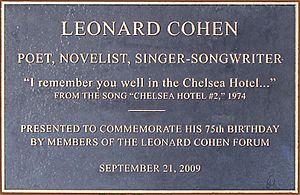
In the 1970s, Cohen was in a relationship with artist Suzanne Elrod. They had two children: a son, Adam (born 1972), and a daughter, Lorca (born 1974). Lorca was named after the poet Federico García Lorca. Adam is also a singer and songwriter, and Lorca is a photographer who worked on Cohen's music videos and tours. Cohen had three grandchildren: Cassius, Viva, and Lyon.
In the 1980s, Cohen was in a relationship with French photographer Dominique Issermann. She directed some of his music videos and her photos were used for his album covers.
Death and Legacy
Leonard Cohen passed away on November 7, 2016, at his home in Los Angeles. He was 82 years old. His death was caused by a fall. His funeral was held in Montreal, Canada, where he was buried in a family plot in the Congregation Shaar Hashomayim cemetery.
Many famous people and leaders shared their sadness and paid tribute to Cohen. In Montreal, people considered naming a street or a library after him to honor his memory.
Cohen's music and poetry continue to inspire people around the world.
Discography
Studio Albums
All albums released on Columbia Records.
- Songs of Leonard Cohen (1967)
- Songs from a Room (1969)
- Songs of Love and Hate (1971)
- New Skin for the Old Ceremony (1974)
- Death of a Ladies' Man (1977)
- Recent Songs (1979)
- Various Positions (1984)
- I'm Your Man (1988)
- The Future (1992)
- Ten New Songs (2001)
- Dear Heather (2004)
- Old Ideas (2012)
- Popular Problems (2014)
- You Want It Darker (2016)
- Thanks for the Dance (2019)
Filmography
- Ladies and Gentlemen... Mr. Leonard Cohen (1965) – a documentary about him
- Angel (1966) – an experimental short film
- Poen (1967) – he was the narrator in this short film
- The Ernie Game (1967) – he was a singer in this film
- Leonard Cohen: Bird on a Wire (1974) – a documentary about his 1972 European tour
- Song of Leonard Cohen (1980) – a documentary filmed during his Smokey Life Tour
- I Am a Hotel (1983) – a short musical film he wrote
- Night Magic (1985) – he wrote all the lyrics for this musical
- Miami Vice S2E17 "French Twist" (1986) – he played a character named François Zolan
- The Tibetan Book of the Dead Part I: A Way of Life and The Tibetan Book of the Dead Part II: The Great Liberation (both 1994) – he was the narrator for these documentaries
- Message to Love (1995) – a concert documentary featuring his performance at the Isle of Wight Festival 1970
- The Favourite Game (1993) – a film based on his first novel
- Leonard Cohen: I'm Your Man (2005) – a documentary and concert film
- Portals (2011) – he had a screenplay credit for this film
- Al Purdy Was Here (2015) – a Canadian documentary film
- Marianne & Leonard: Words of Love (2019) – a documentary about his relationship with Marianne Ihlen
- Hallelujah: Leonard Cohen, A Journey, A Song (2021) – a documentary about his famous song "Hallelujah"
Awards and Honors
Leonard Cohen received many awards throughout his career, including:
- Canadian Music Hall of Fame inductee
- Canadian Songwriters Hall of Fame inductee
- Rock and Roll Hall of Fame inductee
- Order of Canada (Companion)
- Prince of Asturias Award for Literature
- Glenn Gould Prize
- Grammy Award for Best Rock Performance for "You Want It Darker"
- Grammy Lifetime Achievement Award
- Juno Award for Album of the Year
- Juno Award for Artist of the Year
- Juno Award for Songwriter of the Year
Images for kids
See also
 In Spanish: Leonard Cohen para niños
In Spanish: Leonard Cohen para niños
 | Kyle Baker |
 | Joseph Yoakum |
 | Laura Wheeler Waring |
 | Henry Ossawa Tanner |


